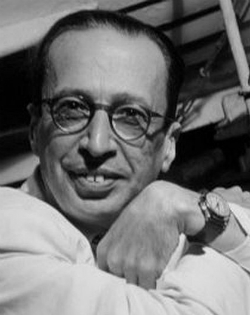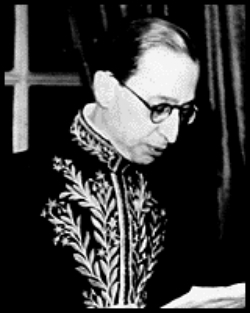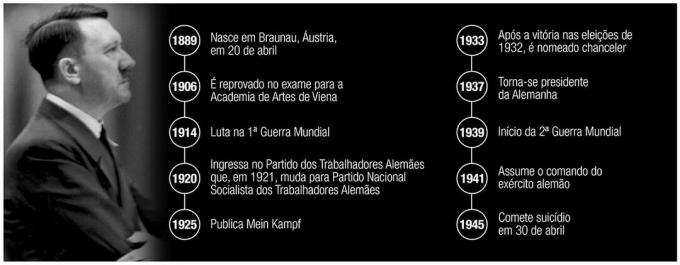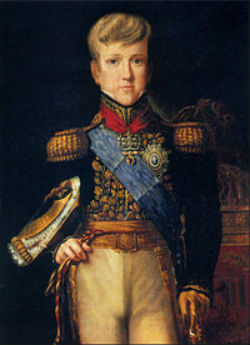Manuel Bandeira he was a Brazilian writer, as well as a teacher, art critic and literary historian. He was part of the first modernist generation in Brazil.
With a work full of poetic lyricism, Bandeira was a fan of free verse, colloquial language, irreverence and creative freedom. The main themes explored by the writer are daily life and melancholy.
Biography

Manuel Carneiro de Sousa Bandeira Filho was born on April 19, 1886, in Recife, Pernambuco.
At the age of ten he moved to Rio de Janeiro where he studied at Colégio Pedro II between 1897 and 1902. Later, he graduated in Letters.
In 1903, he began to study architecture at Faculdade Politécnica in São Paulo. However, he drops out of the course as his health becomes fragile.
Therefore, he seeks to cure himself of tuberculosis in Minas Gerais, Rio de Janeiro and Switzerland, where he remains for a year.
Back in Brazil, in 1914, he dedicated himself to his true passion: literature. During years of work published in journals, he published his first book of poetry entitled “The Ash of the Hours” (1917).
In this work, the poetry “disenchantment” written in the mountainous region of Rio de Janeiro, Teresópolis, in 1912, during his recovery of health:
disenchantment
I make verses like someone crying
From dismay... of disenchantment...
Close my book if for now
You have no reason to cry.My verse is blood. Burning lust...
Scattered sadness... vain remorse...
It hurts in my veins. Bitter and hot,
It falls, drop by drop, from the heart.And in these verses of hoarse anguish
That's how life flows from the lips,
Leaving an acrid flavor in the mouth.– I write verses like someone who dies.
Manuel Bandeira published a vast work until his death, from short stories, poetry, translations and literary reviews.
Along with the literary movement of modernism, collaborated with publications in some magazines such as klaxon and the Anthropophagy.
on the second day of Modern Art Week, your poem the frogs was read by Ronald Carvalho.
The frogs (excerpt from the poem)
Puffing up the conversations,
Come out of the dimness,
Jumping up, the frogs.
The light dazzles them.
In a roar that lands,
yells the bullfrog:
- "My father went to war!"
- "It was not!" - "Was!" - "It was not!".
the cooper toad,
watery Parnassian,
It says: - "My songbook
It's well hammered.
see like cousin
In eating the gaps!
What art! and I never laugh
The cognate terms.
my verse is good
Fruit without chaff.
I rhyme with
Support consonants.
In his work trajectory, he highlights his performance as a professor of Universal Literature at the Externato do Colégio Pedro II, in 1938.
He was also a professor of Hispano-American Literature, from 1942 to 1956, at the Faculdade Nacional de Filosofia, where he retired.
He died in Rio de Janeiro, aged 82, on October 13, 1968, a victim of gastric hemorrhage.
Brazilian Academy of Letters

Manuel Bandeira giving his inaugural speech at ABL
At the Brazilian Academy of Letters (ABL), Manuel Bandeira was the third occupant of Chair 24, elected on August 29, 1940. Previously, the place was occupied by writer Luís Guimarães Filho.
"The emotion with which I now thank you for the honor of seeing me admitted to the Casa de Machado de Assis it is not only inspired by the sympathy of those friends who knew how to bend yours in my favour. spirits. It is also inspired by the sphere of benign shadows, whose heat of immortality ripens the literary vocation." (Excerpt from the Inauguration Speech)
Construction
Manoel Bandeira has one of the greatest poetic works of modern Brazilian literature, among poetry, prose, anthologies and translations:
Poetry
- The Ash of the Hours (1917)
- Carnival (1919)
- Debauchery (1930)
- Morning Star (1936)
- Fifty Years Lira (1940)
Prose
- Chronicle of the Province of Brazil (1936)
- Ouro Preto Guide, Rio de Janeiro (1938)
- Notions of History of Literatures (1940)
- Author of the Chilean Letters (1940)
- Hispanic American Literature (1949)
- From Poets and Poetry - Rio de Janeiro (1954)
- The Paper Flute - Rio de Janeiro (1957)
- Pasargada Itinerary (1957)
- Swallow, Swallow (1966)
Anthology
- Anthology of Brazilian Poets of the Romantic Phase (1937)
- Anthology of Brazilian Poets of the Parnassian Phase (1938)
- Anthology of Contemporary Bissext Brazilian Poets (1946)
- Poetic Anthology (1961)
- Poetry of Brazil (1963)
- Os Vagabundos and over 50 chronicles (1966)
poems
To better understand Manuel Bandeira's language and style, below are some of his best poems:
Guinea pig
when i was six years old
I got a guinea pig.
What a heartache it gave me
Because the pet just wanted to be under the stove!
took him to the room
To the most beautiful, cleanest places
He didn't like:
I wanted to be under the stove.
He took no notice of my tenderness...
“My guinea pig was my first girlfriend.
Pneumothorax
Fever, hemoptysis, dyspnea and night sweats.
A lifetime that could have been and wasn't.
Cough, cough, cough.
He sent for the doctor:
"Say thirty-three."
— Thirty-three… thirty-three… thirty-three…
- Breathe.
"You have an excavation in your left lung and an infiltrated right lung."
"So, doctor, it's not possible to try pneumothorax?"
- No. The only thing to do is play an Argentine tango.
I'm leaving for Pasargada
I'm leaving for Pasargada
I'm a friend of the king there
There I have the woman I want
in the bed i will choose
I'm leaving for Pasargada
I'm leaving for Pasargada
Here I am not happy
There existence is an adventure
so inconsequential
May Joana the Madwoman of Spain
Queen and false insane
Comes to be the counterpart
daughter-in-law I never had
And how will I do gymnastics
I will ride a bike
I will ride a wild donkey
I'll climb the tallow stick
I will bathe in the sea!
And when you're tired
I lie on the riverbank
I send for the mother of water
to tell me the stories
that in my time as a boy
rose came to tell me
I'm leaving for Pasargada
In Pasargada it has everything
It's another civilization
It has a secure process
to prevent conception
It has an automatic telephone
Have alkaloid at will
have beautiful whores
for us to date
And when I'm sadder
But sad that there is no way
when at night give me
will to kill me
— I am a friend of the king there —
I will have the woman I want
in the bed i will choose
I'm leaving for Pasargada.
Read too:
- The Language of Modernism
- First Generation Modernist
- Authors of the First Phase of Modernism in Brazil
- Modern and Contemporary Brazilian Poets



